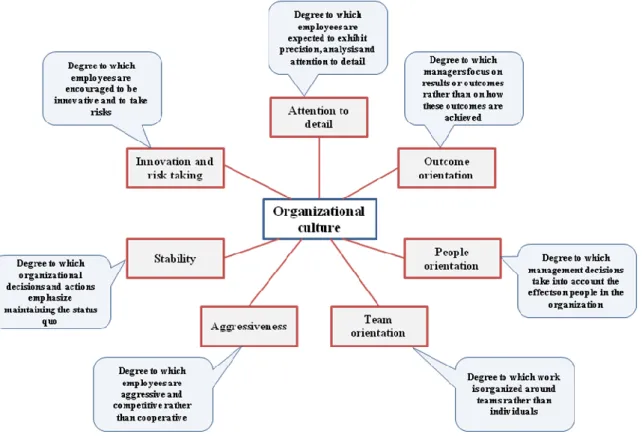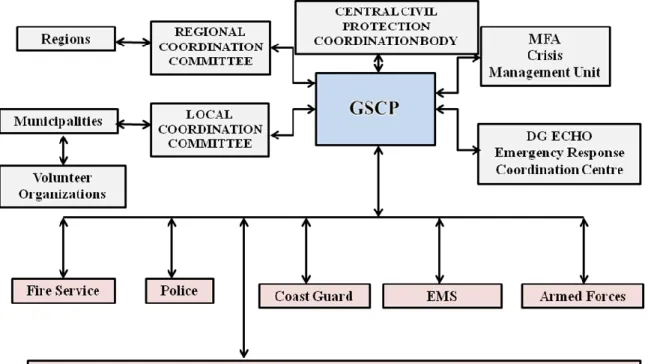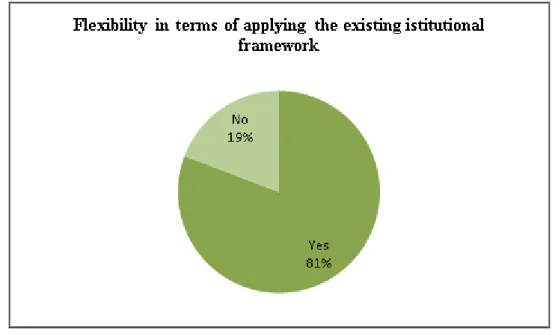Hellenic Open University / Postgraduate Dissertation 7 Figure 5.18: “Financial compensation is sufficient for the given workload and. 69 Figure 5.22: "I chose to work with emergency management, taking into account the specific professional requirements in advance".
Introduction
- The importance of motivation in public sector
- The importance of motivation in Greek public sector
- Contribution of the dissertation
- Dissertation outline
By effectively utilizing organizational change management techniques, such as leadership style and motivation, public sector organizational performance can be upgraded. Moreover, the intervention of politicians in the administration of public organizations still affects the efficiency, continuity and development of the public sector.
Literature Review
Definition of Motivation
This concept led Atkinson to define motivation as 'the contemporary (immediate) influence on the direction, force and persistence of action, while Campbell and Pritchard suggest that 'motivation has to do with a series of independent/dependent variable relationships that influence the direction, amplitude and persistence in an individual's behavior, holding constant the effects of ability, skill, and understanding of the task, and the constraints prevailing in the environment. Robbins (2012, p.558) states that “Motivation is the process by which a person's efforts are reinforced, directed and sustained to achieve a goal”, with these three aspects forming the core of motivation as energy is the force , represents the strength and power. intensity and mental resilience of the effort made, direction shows that the efforts of employees must remain consistent and for the benefit of the organization's objectives and perseverance of the employees.
Motivation theories
- Content Theories
- Contemporary theories
Hellenic Open University / Postdoctoral Dissertation 14 framework of full concentration, dedication and enthusiasm despite the difficulties (Robbins et al., 2012; Bakker et al., 2007). Hellenic Open University / Postgraduate Dissertation 19 outcome and about the attractiveness of that outcome for the individual” (Robbins et al. 2012, p.575).
Methods of motivation
Work simplification as a work design approach whose goal is to improve task efficiency by reducing the number of tasks that a single person must perform (Daft R., 2010, p.454). Job enrichment that includes achievement, recognition and other high-level motivators at work (Daft R., 2010, p.456).
Leadership
- Leadership theories
John French and Bertram Raven identified five sources of leadership power: (1) legitimate (authority or position), (2) coercive (punishment or control), (3) rewarding (giving positive rewards), (4) expertise (special expertise, skills or knowledge), and (5) referent (desired resources or characteristics) (Robbins et al., 2012, p. 620). It is worth saying that leadership has attracted the interest of many researchers and as a result many theories have been developed (Robbins et al., 2012, p. 601-638).
Public sector work motivation
- Intrinsic and Extrinsic Motivation
- Organizational culture as a determinant factor of Public sector work motivation
In particular, the organizational culture - "personality of the organization" - affects the way employees work and communicate with others, plays an important role in the overall functioning of the organization, its success and efficiency (Robbins et. In this context, Furnham and Gunter (cited in Martins and Terblanche, 2003, p. 65) argue that "if the organizational culture does not fulfill these functions satisfactorily, the culture can significantly reduce the effectiveness of the organization".

Definition of Emergency Management Concepts
- Emergency management as primary responsibility world wide
- General Description of Civil Protection system in Greece
- Legal basis of Civil Protection system in Greece
In addition, the GSCP contributes to the good functioning of the Civil Protection Operational Center (CPOC), which joined the Unified Operational Coordination Center (UOCC) of the Hellenic Fire Service (Article 68 of Law 4249/2014). Law on the Reorganization of the Greek Police, Fire Service and General Secretariat for Civil Protection.

Legal framework of motivation in Greek emergency management
Presidential Decree 184/2009: It concerns the constitution of the Ministry of Citizen Protection and the establishment of its competence. 1 of Article 103 of the Greek Constitution which provides that: "Civil servants are the implementers of the will of the state and serve the people, due to their loyalty to the Constitution and dedication to the Motherland" and the first subparagraph of Article 104. The Greek Constitution which provides that "civil servants who hold the positions provided for by law will be permanent as long as these positions exist". Hellenic Open University / Postgraduate Dissertation 36 Also, it is noticeable that the implementation of the "Management by Objectives" System for the year 2019 is being launched, according to the provisions of Law 4369/2016.
At the European level, it is worth mentioning the training program developed by the European Civil Protection Mechanism and the EU, the "Exchange of Experts" program. Both aim at improving the capacity of emergency management personnel and sharing experience in emergency intervention and management (GSCP official site, last access.
Aim of the research
Methodology approach
Benefits of Qualitative method (in-depth interviews)
In depth interviews
- Selected Methodology
- Process of the in depth- interviews - Structure of the interview questionnaire 41
- Demographic characteristics
Findings
Organization culture and leadership
- Organization culture
- Leadership
Essentially, the lack of legal protection psychologically affects 77% of interviewees in the performance of their duties, as it creates inhibitions, doubts and fears at work among the staff involved. Hellenic Open University / Postgraduate Dissertation 51, while concentration problems also often arise, with the emphasis on shifting the solution of the problem to the consequences in the event of an operational error. Hellenic Open University / Postgraduate Dissertation 52 The paradox is that care providers sometimes try to shift responsibilities or pass them on to others, precisely out of fear of being accused at an operational level.
Regarding psychological support, 62% of respondents argue that psychological effects on personnel involved in emergency management are not recognized by the state in terms of providing emergency measures (Question 6), although the same participants rate this as very important because their work is closely linked to human drama (human losses, injuries, amputations, grief, fear, mourning, etc.) with consequences for the mental health of the personnel involved (e.g. 65% of respondents believe that they have the right equipment to perform their duties safely and effectively perform their duties (question 8).Hellenic Open University / Postgraduate Dissertation 59 When asked whether the task and personnel allocation is considered satisfactory by employees (question 11), we were given shared results with 58% of interviewees confirming this statement, highlighting even though there is a lot of room for improvement.
Discretionary powers in the hands of the right person can be useful for managing emergencies.

Extrinsic – intrinsic motivation
Discussion
Organizational culture
The findings clearly confirm that the organizational culture of the Greek Public Sector indeed significantly influences the actual working conditions and the work performed by employees engaged in the field of emergency management of the Greek Public Sector. Hellenic Open University / Postgraduate Dissertation 80 culture of emergency management makes more sense to remind. The critical work of human resources employed in emergency management can be undermined by insufficient training which consequently directly affects the effectiveness of the relief efforts and the staff capacity (Wright and Foster, 2018).
Nevertheless, as already discussed, the organizational culture and the working environment of the Greek public administration affect the field of emergency, as it was found that there is much room for improvement in terms of the organizational environment and the motivational dynamics of the employees in the field of emergency management primarily within the areas. The cultivation of a culture that increases uncertainty and hesitation ultimately diminishes the effectiveness of emergency management (Wright and Foster, 2018).
Extrinsic and Intrinsic Motivation
Conclusions, Limitations and Future Research
Conclusions
The importance of the 'human element' in emergency management highlights the need to optimize the human resources occupied in the well-being and effectiveness of the emergency area (Wright and Foster, 2018, p.112). Theoretically, a critical factor in the effectiveness of emergency professionals and, as a result, in emergency management in general, is a human resource management perspective. In addition, emergency management personnel are at high risk of developing post-traumatic stress disorder (PTSD), substance abuse problems and other negative psychological outcomes.
In this context, training of these types of employees promotes the development of the specific knowledge and skills they must use in the field of emergency management. For this purpose, teamwork and good communication are considered key words in emergency management and these principles are crucial to be established in advance.
Limitations
Hellenic Open University / Postgraduate Dissertation 88 becoming a business value of strategic importance, since in this way managers create an organizational environment where individuals enthusiastically contribute intellectual, emotional and physical resources to the achievement of the goals of an organization or group always in harmony with its culture ( McCoy J., 2012). Motives and conditions such as supervisor support, innovation, information, appreciation, empowerment, and organizational climate can all be considered important factors that drive engaged employees to have a positive state of mind about work that is characterized by energy, commitment, and absorption. without neglecting. social life outside of work, which may consist of interests and activities such as enjoying family time, socializing, volunteering, etc. Managers should also pursue maximizing work motivation by promoting participation in decision-making, responsible and challenging work, and good group relations that correspond to the argument of the theory that suggests that "Allowing employees to be more involved in making related decisions at work is positively related to organizational performance" (Delaney and Huselid 1996; Wagar 1998 cited in Brewer and Selden, 2000, p. 694).
In summary, the challenge for this field of emergency management is indeed to achieve the emergency management's goals for effectiveness and productivity with the needs of employees for motivation, reward and satisfaction (Manolopoulos D., 2008) which means that leadership and human resource management must create this organizational conditions that boost employees' well-being and increase their moral satisfaction and recognition, task motivation and public interest. Hellenic Open University / Postgraduate Dissertation 89 interviews, even if they are sufficient, it is not certain whether they fully covered the objectives of the study.
Future research
Given that people working in the field of emergency management are faced with loss of life, property, etc., do you believe that the state provides you with adequate legal protection against any assignment of responsibilities. Make sure you have the appropriate equipment to carry out your work efficiently and safely. Do you think that the methods of selecting and evaluating supervisors/staff respond to an effective emergency management (If not, do you think that some specific characteristics are required?).
Do you consider that the allocation of political staff to senior leadership positions in emergency management contributes to the continuity and effectiveness of emergency management? Do you consider that job security contributes positively to the performance of your duties?